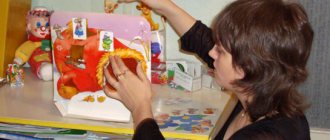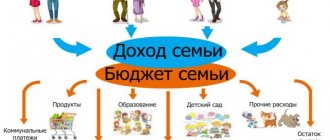Self-analysis of speech therapy classes in preschool educational institutions
Self-analysis of speech therapy classes is an important element in the work of a teacher. This is the main way to improve your skills. The quality of self-analysis depends on the critical attitude of the speech therapist to his classes, on the habit of reflecting on his actions.
Criteria and assessments of speech therapy classes
When conducting a self-analysis of a speech therapy session at school or kindergarten, the speech therapist must answer the following questions:
- What is the motivation for selecting material for a particular lesson?
- Describe the group as a whole
- Do the objectives of the lesson coincide with the planned plan?
- What is the psychological assessment of the tasks that children performed in class?
- What is the pedagogy of the exercises performed
- Describe your overall satisfaction with the activity
- Evaluate the results and outline measures to eliminate deficiencies
Important! Self-esteem is a condition for the creative work of a speech therapist teacher. A technological map for self-analysis of a speech therapy session will help with self-analysis.
Content and specificity of the frontal form of organizing educational activities
Definition 1
The frontal form of organizing educational activities is the organization of educational work in the lesson, in which all students perform activities of the same focus, resorting to discussion and joint adjustment in the process of implementation.
Figure 1. Frontal form of organizing educational activities. Author24 - online exchange of student work
Are you an expert in this subject area? We invite you to become the author of the Directory Working Conditions
After completing the lesson, monitoring and evaluation also takes place, summing up the results of the activity.
The interaction between the teacher and students in the learning process is collaborative. The teacher does not single out individual students or a group, but interacts simultaneously with the entire team, using techniques such as: story, conversation, lecture, demonstration, explanation, characterization. This approach maximally develops communication skills in students and creates a sense of collective interaction and responsibility. In cognitive activity, the frontal form contributes to the development of reasoning skills, identifying errors in the views and judgments of peers, evaluating one’s own work and the activities of comrades. This contributes to the formation and development of cognitive activity and interest, develops the desire to demonstrate creative activity and independent activity. achieving these goals occurs through the use of:
- Problem-based approach;
- Explanatory and demonstration techniques;
- Information support.
Finished works on a similar topic
Course work Frontal form of organization of educational activities 430 ₽ Abstract Frontal form of organization of educational activities 270 ₽ Examination Frontal form of organization of educational activities 230 ₽
Receive completed work or specialist advice on your educational project Find out the cost
These techniques can be supplemented with various reproductive and creative tasks. A creative task can be organized in such a way as to ensure a transition from simple to complex, i.e. divided into several simple tasks with a creative focus. This is necessary to attract all students to work and their active interaction with the team. Based on the results of such an organization, the teacher can assess the abilities and capabilities of each student in order to adjust the complexity of the proposed tasks if necessary.
The use of the frontal form of organizing educational activities has a positive effect on creating a comfortable, friendly environment in the school community and in the classroom, forms a system of close relationships between the teacher and students, and also strengthens each student’s sense of need and importance, awareness of their importance in the results of overall collective work.
An important role in the effectiveness of using the frontal form of teaching organization rests on the shoulders of the teacher. Its mission includes careful planning of all activities, including:
- Development of a project for completing a training session;
- Designing learning situations that meet the intended purpose of educational work;
- Skills of listening to all available points of view on the research topic;
- Tolerance and tactfulness of the teacher in relation to erroneous judgments of students;
- Competent and tactful introduction of amendments into the discussion;
- Taking into account the capabilities and abilities of students when conducting surveys;
Frontal learning reflects collective thinking about the information learned during the training session. This develops the skills of listening and memorizing educational information, provides an opportunity to share one’s opinion and knowledge, develop the skills of listening and perceiving other people’s opinions, adequately evaluating them and analyzing their effectiveness.
Note 1
For a teacher, when using a group form of education, opportunities open up to provide an educational impact not on individual students, but on the entire class team as a whole. Therefore, this form is widely used in modern society.




